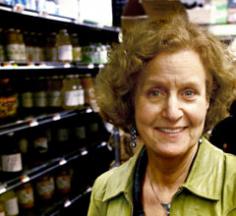Richard Mandelbaum is an herbalist, activist, and member of the Brooklyn Food Coalition who divides his time with his family between Brooklyn and Sullivan County, NY. Until December 2011 he served on the board of the FCWA.
The following is excerpted from the FCWA website, where more information on its mission and work can be found: http://foodchainworkers.org/Working conditions throughout the U.S. food chain – from farm to fork – were discussed in an earlier blog post: http://bkfoodconference.org/justice-for-food-workers/
The Food Chain Workers Alliance is a coalition of worker-based organizations whose members plant, harvest, process, pack, transport, prepare, serve, and sell food, organizing to improve wages and working conditions for all workers along the food chain. The Alliance was founded in July 2009. The Alliance works together to build a more sustainable food system that respects workers’ rights, based on the principles of social, environmental and racial justice, in which everyone has access to healthy and affordable food.
The following is the mission statement of the Alliance:
Food is a human right, and the human rights of those who produce our food, from field to table, should be respected as well. By coming together in the Food Chain Workers Alliance, our member organizations will have greater power to improve the wages and working conditions of food system workers and their families. In this way we can challenge institutionalized racism and balance out the immense corporate power over our food system in order to work towards ending poverty and therefore hunger, as well as to truly achieve sustainable agricultural practices, environmental justice, and respect for workers’ and community rights.
The Alliance’s work focuses on: leadership development and solidarity, policy and standards, campaigns, and education.
- The current members of FCWA are:
- Brandworkers International (NYC)
- Center for New Community (Midwest)
- Coalition of Immokalee Workers (FL)
- Comite de Apoyo a los Trabajadores Agricolas / Farmworker Support Committee (NJ/PA/DE/MD)
- International Labor Rights Forum
- Just Harvest USA
- Northwest Arkansas Workers Justice Center (AR)
- Restaurant Opportunities Center of New York (NY)
- Restaurant Opportunities Centers United (Washington, D.C., Miami, Chicago, Detroit, New Orleans, Los Angeles, and New York City)
- UNITE HERE Food Service Division (nationwide)
- United Food and Commercial Workers Local 770 (southern CA)
- United Food and Commercial Workers Local 1500 (NYC)
- Warehouse Workers for Justice (IL)
The Alliance is a sponsor of the Brooklyn Food Conference and its member organizations will have a strong showing in the workshops throughout the day. The Brooklyn Food Coalition’s new labor committee will ensure that these issues will be a central part of BFC’s work going forward.
In addition, the Alliance will be holding a conference of its own – Food Workers and Food Justice - on June 6, 2012, here in New York City. (For more information or to register go to: http://foodchainworkers.org/?p=1868). The day will begin with the release of the FCWA report THE HANDS THAT FEED US: Challenges and Opportunities for Workers Along the Food Chain - the first-ever comprehensive report on the state of food workers in the U.S. and workers will speak about how the report reflects their own experiences working in the food system. That will be followed by breakout sessions to focus on the policy recommendations in the report. Right after lunch, there will be a panel focused on the policy initiatives of three New York City-based FCWA member groups: the Restaurant Opportunities Center of New York’s proposed policy to tie liquor licenses to employment standards and the sale of healthy, nutritious food; UFCW Local 1500 and ALIGN’s efforts to require community involvement and good jobs to funding support for new grocery stores in underserved neighborhoods; and Brandworkers International’s effort to include labor standards for any food manufacturing businesses that receive loans and other financial incentives in the City’s Economic Development Corporation.
 In anticipation of the second Brooklyn Food Conference on May 12th, Rosalin Luetum touched base with Nancy Romer (pictured left), the General Coordinator of the Coalition, to learn how the ‘movement’ has made strides and what the priority areas are now.
In anticipation of the second Brooklyn Food Conference on May 12th, Rosalin Luetum touched base with Nancy Romer (pictured left), the General Coordinator of the Coalition, to learn how the ‘movement’ has made strides and what the priority areas are now.